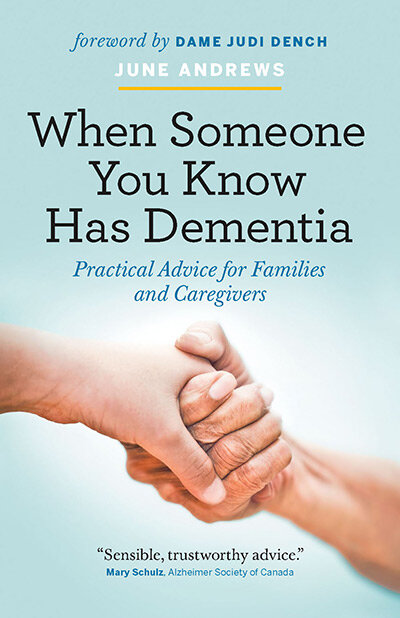
When Someone
You Know has Dementia
Practical Advice for Families and Caregivers
When Someone You Know Has Dementia is full of practical advice.
It is based on the best-selling book Dementia – the One Stop Guide which was written for families in the UK. Readers welcomed the practical information and advice about how to cope with the dementia journey the best way you can. It sold in tens of thousands in the first few months, but those outside of the UK were frustrated that it was too specific to the British health system. So here is the answer.
Everyone has a unique experience, but in general there are two possible routes with dementia. On one track you stay as well as possible for as long as possible, living life the way you want to. On the other you go downhill faster than you need to, for reasons that are often avoidable.
On one track you stay as well as possible for as long as possible, living life the way you want to. On the other you go downhill faster than you need to, for reasons that are often avoidable.
Everyone would like to avoid unnecessary trouble and expense, and to delay some of the difficult situations that might arise. Sensible, practical advice on how to do this is in short supply. People aren’t told about the remarkable services and equipment that are readily available or the simple changes to their lifestyle that can be so radical that they prevent the need to go into a care home.
Practical advice about dementia and Alzheimer’s to make a difference
When Someone You Know has Dementia provides information about what will make a difference in the lives of people with dementia, their carers and caregivers. It is practical and compact, and builds on the ‘One Stop Guide’. In setting out to write this, I’ve drawn on information that is freely available if you’ve got a clinical qualification that prepares you to understand it and a few months to research it. However, when someone in your family gets Alzheimer’s or another form of dementia you may not have that sort of time. This book is for you.
So clear and practical ... this book will help families and friends of people with dementia all over the world, and be a support to those professionals who work to improve their difficult journey.—Dame Judi Dench
The idea of this guide is to provide as much information as possible in a portable form. Some people read previous editions like a novel, from start to finish, and they say they found it really useful, but they were concerned that some advice is repeated. There’s a reason for that. Carers and people with dementia are busy. They may dip into the book, and so if something is worth saying against more than one topic, it is mentioned under both in case you are only reading one chapter at any time.
A book for Professional health and social care and care workers too
A note for professional health and social care and care workers – some have thought of this as a book for families and carers, rather than professionals. This book is absolutely for you as well. You can either give it to your patient or client, or you can read it yourself and use it as a script for useful things you can tell them in your clinical encounter, or when you are advising them while working alongside them at home.
The aim of everything is to base what we say on research. You won’t find many footnotes or references here, but we are happy to take questions if you think that there is research that contradicts what the book says. Time passes and new things are found all the time. So though the book is light on academic language and style, I hope that it is fundamentally focused on what is practical, makes a difference and is based on evidence.
I wish you all the best on this difficult journey.
If you would like more information, you can buy my book Dementia, the One Stop Guide or Care Homes: When, Why and How to Choose a Care Home. And if you have any further queries or questions, please contact me at info@juneandrews.net
When Someone You Know Has Dementia: Practical Advice for Families and Caregivers






